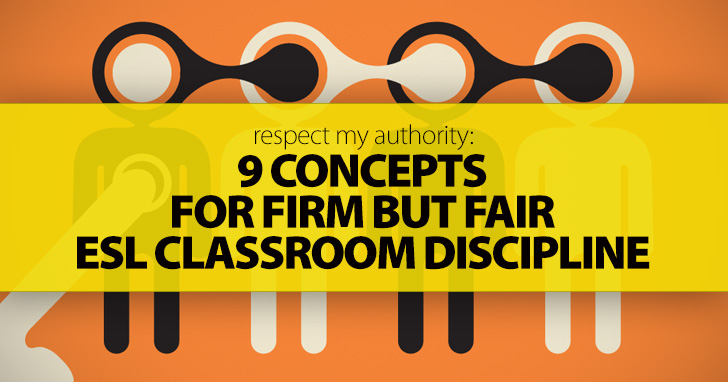
The Chinese have a saying:
If you are patient in one moment of anger, you will escape a hundred days of sorrow.
Without control of our emotions, it is said, we are apt to behave in ways which harm our relationships with those around us and cause unnecessary stress. As teachers, we have all faced frustrating situations, perhaps to the point of raising our voices or lashing out with punitive measures. Over my years in the classroom, I’ve found that sanctions and penalties can be counter-productive, and might actually result in the weakening of a teacher’s authority. Instead, I’ve come to believe in ‘prevention rather than cure’, putting in place systems of discipline which reward good focus, raise students’ awareness of their own behavior and its impact on others, and undermine tendencies which lead to poor discipline before they can take a firm hold.

What is Discipline, and When Do We Need It?
I’ll say it right from the start: Discipline IS NOT punishment. I recognize that we use the verb in just that way (as in, “Do you discipline your children?”) but I want to very clearly separate these two ideas.
For me, discipline is the provision of a structure which guides our students towards best practice. Its sole aim is to bring good order to the classroom environment. It is not about power or control, and it certainly isn’t about making the learning experience more difficult or painful. In fact, the reverse is true; a well-disciplined class is bright and cheerful, progresses through consent and mutual respect, not through fear or the imposition of arbitrary rules, and has (tacitly or explicitly) agreed a simple code of conduct which benefits everyone.
We have all struggled with a class which becomes dominated by one or more ‘difficult’ personalities. Often, these students are simply bored and need a greater challenge. Increasingly, there may be psychological or behavioral issues which are beyond both the remit of a typical classroom teacher and the scope of this article. Most ESL classes are populated by young learners and teenagers, groups which can often pose disciplinary challenges. In my experience, discipline becomes important in the following areas, among others:
- Students using their first language (L1)
- Students becoming distracted
- Students failing to complete homework
- Students complaining about the work
- Students forgetting to bring their books, or a pen
- Students breaking the rules on the use of cellphones
- Students falling asleep in class
- Students moving off-topic and/or not using the target language
- Students flirting in class
- Students bullying their classmates
- Racism, sexism, homophobia and other forms of discrimination
What can we do in such situations? Is it possible to be firm and authoritative without alienating or upsetting our students?
I believe so. The root of our authority can be the quick building of a rapport with the students, during our first few days or weeks of the class. This engenders mutual respect, opens channels of communications and, at least in my experience, eliminates most disciplinary problems before they can start. Think back to high school; were you on your best behavior for the teacher you couldn’t stand, or for the teacher whose insights changed your life? Which professor did you most respect? What were their characteristics? Did their yell or dish out unpleasant punishments? Or did they, perhaps, win you over with candor, good humor, honesty and inclusiveness?

Building Authority
There can be little authority without respect, and as we all know, respect is earned, not given automatically. I’d like to offer some suggestions on how to raise the likelihood that your students will quickly respect and admire you as a teacher and grant you the right to preside over the classroom. Your authority is then wielded with the students’ permission, rather than as a result of a prolonged wrestling for control.
-
1
Earn It
It’s worth repeating. Especially with young learners, there is no guarantee whatsoever that, simply because you’re the one holding the chalk, you’ll have their respect. Give the students multiple reasons to take you seriously and to listen to what you have to say. Many of these are mentioned below.
-
2
Prepare
Students have a sixth sense for those awkward, unpleasant moments in which their teacher has become uncertain of their footing. We’ve all felt it, and it sucks! The trick here is not to over-extend yourself; if you’re not sure, ask for a moment (or the evening) to gather your thoughts, or compose a good example. There’s nothing wrong with this kind of reaction: “You know, that’s a great question, and I want to make sure I give you the best answer I can. Let’s talk about it tomorrow – remind me, OK?” Make a note of the question and come back to it when there has been sufficient preparation time.
In the same way, I’ve found that students respond extremely well to the tactical deployment of a neat fact. Have a store of these at your disposal and build it up as your career progresses. You’d be amazed how much young people don’t know (yet) and how impressed they will be if you demonstrate a solid general knowledge.
-
3
Praise Them, but Only Like You Should
Everyone loves being praised or thanked. Keep the really big reactions (a massive thumbs up and a beaming smile) for those special moments, so that the students are given parameters which are logical and consistent. Many ESL students, especially shy Asian learners, absolutely love the celebratory high-five I give when they successfully make their way through a nasty tongue-twister (‘Larry was surprised when the supplies arrived’ is a real favorite!) or correctly navigate some complex grammar (like conjugating the future perfect).
-
4
Use Your Body
Your posture speaks volumes. Slouching, leaning against something, putting your feet on the desk, or any of the other symbols of disinterest are very strong signals to your students that you just don’t care. Of course you do, so stand up straight, keep eye contact, make generous, clear gestures and keep moving.
-
5
You’re Top Dog
Without necessarily articulating it, bear in mind that you are the boss.The social mix of a classroom resembles that of a group of animals; there are leaders and followers, decision-makers who are active, and shy individuals who are more passive. Expect and anticipate this phenomenon, identifying who is likely to be dominant, and then deliberately control their space. This needn’t even be detectable. You’re aiming to remove the preconditions by which an Alpha-type student might question or undermine your authority. Sure, they’re funny... but not that funny. They’re knowledgeable and skilled... but they don’t know everything.
Without necessarily articulating it, bear in mind that you are the boss. The teacher has the education, the life experience, the professional skills, the thousands of hours in the classroom, and the long history of tackling issues just like these; no student has these things, certainly not a teenager. Whatever your students do, and however they respond to you, remember that there’s only one person who should have authority, and that’s you.
-
6
Keep the Work / Fun Balance
It’s very tempting to ‘buy off’ an unruly class with a game, a movie or a field trip. Deploy these priceless gems carefully; don’t be afraid to make the students work for their fun. Be firm: if you haven’t heard the production you’re looking for, don’t reward the class until you have. If they’re still ignoring the final ‘s’ on third-person conjugations, hold back the praise and prizes until they show you that it’s in place.
-
7
I’m Not Angry, I’m Disappointed
Remember when your parents used to say this? It hurt more than the anger! Raising your voice and losing your temper – this is an opinion, but one which is very carefully considered – are a failure. They are the worst reaction to poor discipline, and could damage the rapport which is essential to creating and maintaining your authority.
-
8
Work With Me
When describing my current course load, I tend to say that I ‘work with’ a certain class, rather than I ‘teach’ them. This may seem inconsequential, but consider the dynamic implied by the two: one speaks of a unidirectional flow of information and opinion, while the other connotes a mutuality of contribution and effort. Take a moment to ponder which side of this line your teaching style is on.
-
9
Stop Hitting Yourself
I recently became convinced that the entirety of my class had plagiarized their term papers. This was a terrible moment. How could they try to deceive me like this? I thought we had a good thing going, and then they pull something so cheap, so beneath them! Ultimately, I learned that they had comprehensively misunderstood the conventions of citation and bibliography; it was less plagiarism than a lack of experience. However, I was obliged to tell the students that they had broken the rules. Rather than lecture them on the virtues of honesty and academic rigor, I made a plea: Don’t make me be a hardass. My school had a very strict integrity code, which I said I would enforce if they compelled me to. This took the teacher out of the equation; instead, they were battling an immovable school policy, rather than a generally flexible, friendly instructor; their troubles became self-inflicted, and suddenly had nothing to do with me. This avoided unnecessary accusations and unpleasantness.
Dishing It Out
If you do need to sanction your students, I recommend a measured, compassionate approach which might include some of the following:
- Make the student dance or sing a song
- Paint the student’s nose with your whiteboard marker
- Set additional homework
- Bring forward a deadline
- Threaten to reduce the student’s grade
- Threaten to mark the student absent for that class, though they attended
- Make the student produce some language as their punishment; my favorites are asking them to answer questions in the conditional or modal forms, e.g. “What would have happened if you had not been late today?” or “How might your week have been different if you hadn’t copied your homework from Wikipedia?”
However you choose to sanction your students, I believe it should be relatively light and a truly memorable experience.
Humiliation (singing, dancing, doing an impression or an animal noise) works well in this regard; the student will never forget that red-faced moment when they had to crow like a rooster right in front of that gorgeous classmate they’d been trying to impress. There should be no malice in these sanctions, merely the uniquely unforgettable packaging of a behavioral reminder.
I hope your classes are smooth, without undue stress, and that these tips help you keep your cool and create a useful and productive atmosphere of mutual respect!
P.S. If you enjoyed this article, please help spread it by clicking one of those sharing buttons below. And if you are interested in more, you should follow our Facebook page where we share more about creative, non-boring ways to teach English.







